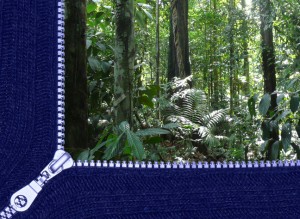
Asia Pulp and Paper is having a hard time holding onto customers these days. With the release of its forest products purchasing policy, Levi Strauss & Company has become the latest major brand to ban business with Asia Pulp and Paper (APP). This comes on the heels of a major public cancellation with APP affiliate Mercury Paper at the end of December by Kroger, America’s largest grocery chain.
So why is everyone running from APP?
APP has a nasty penchant for clearcutting Indonesia’s rainforests and disrespecting communities’ rights — and these abuses are proving to be bad for business. Despite the company’s deep pockets for slick PR greenwash campaigns, its tactics aren’t fooling a lot of customers. Over the past several years, a growing list of major companies have dropped their contracts with APP, including major US book publishers Scholastic, Hachette, and Simon & Schuster, leading toy companies Mattel, Hasbro and Lego, fashion giants Gucci and Tiffany and Co., and office supply stores Staples and Office Depot.
Levi’s new global policy not only excludes controversial fiber supplies linked to rainforest destruction (like that from APP), it also proactively maximizes the best environmental fibers available. For paper, it mandates that all paper purchased by the company be at least 30% post-consumer recycled content, with a goal of 100% whenever possible. When post-consumer recycled is not available, wood fiber must be certified by the Forest Stewardship Council.
Levi’s and other responsible corporate customers are implementing forward-looking policies that maximize the best environmental fiber and eliminate controversial sources. Meanwhile, reform for APP’s clearcutting ways still seems to be in the distant future. For the time being, it’s hard to imagine this list of APP customer cancellations doing anything but growing.